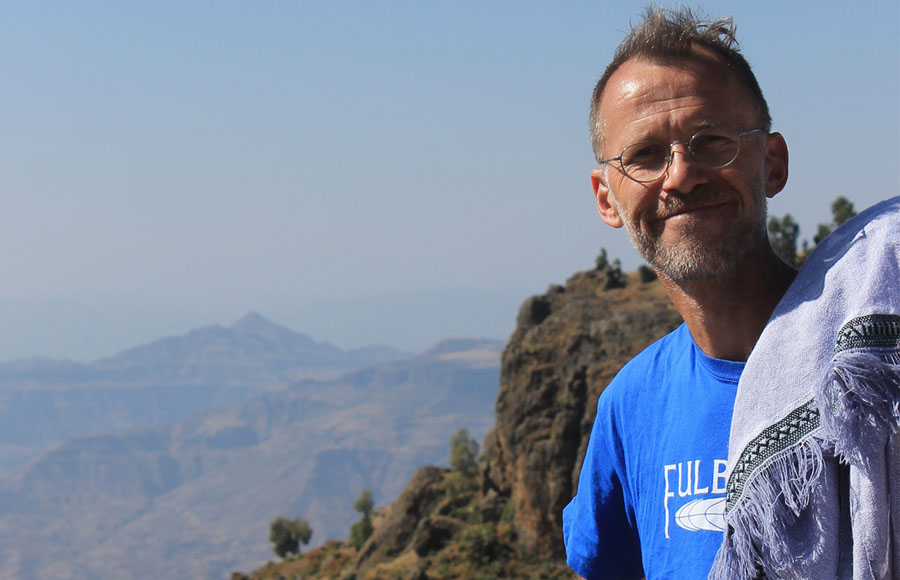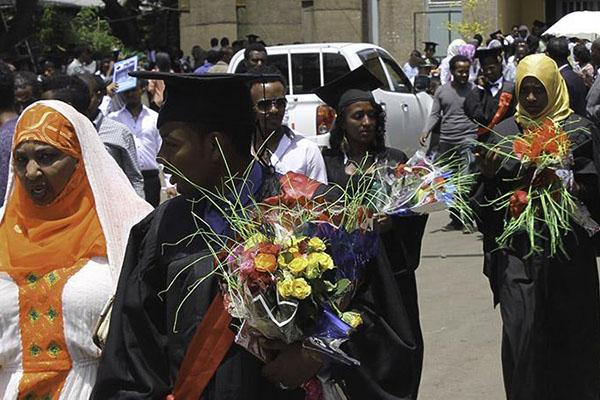Ethiopia is rapidly expanding its higher education system in an effort to modernize the nation’s economy. Among the challenges in this endeavor: producing enough Ph.D.-level faculty to teach in its public universities, which the government has increased from two to more than 30 in the past 15 years.
As a Fulbright Scholar in 2015-16, the Reich College of Education’s Dr. Vachel Miller taught doctoral students in the new educational policy and leadership program at Bahir Dar University (BDU) in Ethiopia. This is the same academic program Miller helped develop, aided by a small grant from the U.S. Embassy in Ethiopia that facilitated exchanges between BDU and Appalachian State University.
Miller said he found the yearlong teaching opportunity highly rewarding – so much so, he extended his stay another month through Fulbright.
“I was able to develop a collaborative learning community among the students and open new ways for them to think about leadership and change in the higher education system in Ethiopia,” Miller wrote in his final report to the Fulbright Scholar Program. “In this respect, the Fulbright year enabled me to have a significant influence in a program that intends to train future professors and educational leaders in Ethiopia.”
He also engaged in two research projects with Ethiopian colleagues: mapping inequalities in students’ access to secondary schooling and interviewing academic department heads about the challenges they face during this period of educational expansion.
Miller said BDU has invited him back and welcomes other international faculty, too. Ethiopia’s higher education system is expanding so fast, Miller said, BDU and other universities can’t staff their own graduate-level programs with enough Ph.D.-trained Ethiopian faculty.
In the meantime, Miller has returned to Appalachian as program director of the Department of Leadership and Educational Studies’ graduate program in higher education. “Ethiopia certainly presents rich case material of global dynamics linking the U.S and Ethiopia,” he said. He teaches Globalization of Higher Education among other classes.
What do you think?
Share your feedback on this story.
About the Department of Leadership and Educational Studies
The Department of Leadership and Educational Studies at Appalachian State University prepares traditional and nontraditional students to assume educational leadership roles in community colleges, universities, public schools, public libraries and related educational settings through active scholarship, reflection, professional discourse and interdisciplinary programs of study based on the integration of theory and practice. The department, housed in App State's Reich College of Education, offers a doctoral program in educational leadership, as well as support courses in educational foundations and research. Learn more at https://les.appstate.edu.
About the Reich College of Education
Appalachian State University offers one of the largest undergraduate teacher preparation programs in North Carolina, graduating about 500 teachers a year. The Reich College of Education enrolls more than 2,000 students in its bachelor’s, master’s, education specialist and doctoral degree programs, with offerings that span multiple fields — from teacher preparation, counseling, and therapy, to higher education, school and student affairs administration, library science, educational leadership and more. With over 10,000 alumni employed in North Carolina public schools, there is at least one Reich College graduate in every county in the state. Learn more at https://rcoe.appstate.edu.
About Appalachian State University
As a premier public institution, Appalachian State University prepares students to lead purposeful lives. App State is one of 17 campuses in the University of North Carolina System, with a national reputation for innovative teaching and opening access to a high-quality, cost-effective education. The university enrolls more than 21,000 students, has a low student-to-faculty ratio and offers more than 150 undergraduate and 80 graduate majors at its Boone and Hickory campuses and through App State Online. Learn more at https://www.appstate.edu.




![How NCInnovation Is Rethinking Economic Development in North Carolina [faculty featured]](/_images/_posts/2026/02/rethinking-economic-development-600x400.jpg)








